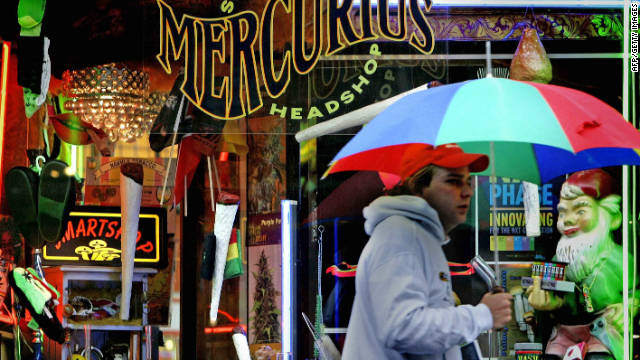Dutch city's coffee shops close doors to most cannabis tourists
CNN.,10:36 AM EST, Sat October 1, 2011
-

A pedestrian walks past a legal cannabis hardware store in the Dutch city of Maastricht.
-
Coffee shops in the Netherlands are places where customers can legally buy and consume cannabis.
"We have put in place a 'neighbouring country' criteria," Marc Josemans, president of the Society of United Coffeeshops and owner of the Easy Going coffee shop, told CNN.
"This is a form of self-regulation. It is not a law, there will be no judge, this was just the only choice we had."
The move comes after Maastricht's city council decided that something had to be done about the 2.2 million visitors that come to the city every year, according to Josemans.
-
"The visitors put a lot of pressure on the city when they come here and make it very busy on our narrow streets. So the city said that something had to be done about the traffic and nuisance," he said.
"But the biggest nuisance isn't the number of coffee shops or the clients, but the illegal drug runners that can be quite aggressive and start fights and rob the tourists."
All visitors to Maastricht's coffee shops -- some 6,000 a day, almost three-quarters of whom are foreign, according to Josemans -- already have to show their passports and their information is then kept for 48 hours.
-
Now only those with a Dutch, German or Belgian passport will be allowed in.
"A number of people will leave disappointed, and we are not very proud of refusing entry to visitors who have come to our shops for the last 28 years and never caused a problem," said Josemans, who has himself used cannabis for 35 years.
"The question now will be if they instead buy from the illegal drug runners here or if they buy illegally in their own countries."
-
Nobody from Maastricht city council was available for comment Saturday.
A spokeswoman for Maastricht police told CNN that the police were not a party to the ban and that it is not illegal for foreign tourists to enter the city's coffee shops.
The spokeswoman, who is not named in line with department policy, said police would not carry out any identity checks to enforce the ban. "We will just go about our normal business and carry out our duties where needed," she said.
At spokeswoman at the tourist office for Maastricht, which lies near the Belgian border, said it was not aware of the new rules.
The Society of United Coffeeshops decided on the ban in July but it only came into effect October 1.
The organization is also working on a plan to move seven of the city's 14 coffee shops to the outskirts, where foreign tourists can then go and buy hash and marijuana, Josemans said.
"But the first relocation won't happen until June 2013, so we had to put this ban in place now, and we could then change it again once we've completed the relocation.
"At these new sites, the parking (areas) will have direct access to the coffee shops, so the drug runners can't approach the clients as they walk to the coffee shop."
-
Josemans also says the Dutch government wants the coffee shops to operate on a smaller scale and is planning to impose a nationwide ban on anyone who doesn't hold a Dutch passport buying cannabis.
"They want to put this 'weed pass' in place from January 1 next year, but we are strongly against this."
A press release on the Dutch Ministry of Security and Justice website from May this year says coffee shops will become private clubs where only adult Dutch citizens can become members.
-
"The Cabinet expects that closure of coffee shops to foreign drugs tourists will ensure that they no longer travel to the Netherlands to purchase and consume cannabis. After all, many of them can use the illegal markets available in their immediate surroundings," the press release says.
The statement does not give a date for the implementation of the new measures.
-
CNN's calls to the Dutch justice ministry were not immediately returned.
But Josemans says cannabis supply is not only a Dutch problem.
"This is also the responsibility of the other European governments; nobody is taking responsibility for those millions of customers who want to buy cannabis for their own use," he said.
"It is time to get their heads out of the sand to get a decent drugs policy in place to address this problem

No comments:
Post a Comment